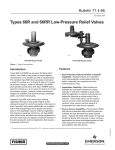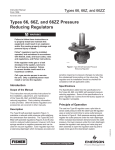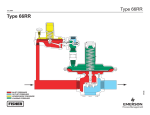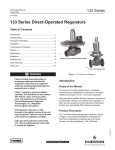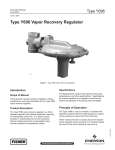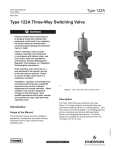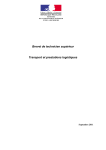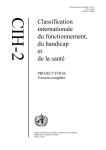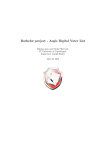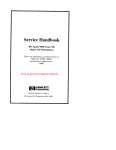Download Emerson 66R Instruction Manual
Transcript
Types 66R and 66RR Instruction Manual Form 1737 November 2009 Types 66R and 66RR Relief Valves Introduction Scope of the Manual This manual describes and provides instructions, installation, and parts list for Type 66R direct-operated relief valve* and for Type 66RR pilot-operated relief valve* complete with Type Y695RR pilot. Instructions and parts list for other Fisher® equipment used with these relief valves are found in separate manuals. W1935 Product Description TYPE 66R RELIEF VALVE Types 66R and 66RR throttling relief valves (Figure 1) are used to help protect a system against overpressure, or to maintain an inlet or backpressure. The Type 66R directoperated construction is used for set pressure ranges of 2-inches w.c. to 5 psig (5 mbar to 0,34 bar), while the Type 66RR pilot-operated construction with the Type Y695RR pilot is used for set pressure ranges of 4-inches w.c. to 7 psig (10 mbar to 0,48 bar). Specifications Refer to Specifications for Types 66R and 66RR constructions listed on page 2. Some specifications for a given relief valve as it originally comes from the factory are stamped on nameplates located on the Type 66R relief valve body or Type 66RR main valve body. W1908 Principle of Operation TYPE 66RR RELIEF VALVE Figure 1. Typical Constructions Type 66R Relief Valve Refer to Figure 2. Inlet pressure registers under the diaphragm and is opposed by the spring. When the inlet pressure increases above the spring setting, the valve plug opens in a throttling manner and relieves the inlet pressure. As inlet pressure drops back to set pressure, the spring closes the valve plug. Type 66RR Relief Valve Refer to Figure 2. Inlet pressure registers on the bottom of the pilot diaphragm through the upstream control line and bleeds through a fixed restriction in the pilot to provide loading pressure that helps the main valve spring keep the main valve plug tightly shut off. When inlet pressure exceeds the setting of the pilot spring, the pilot diaphragm moves upward, opening the pilot valve disk and relieving D100248X012 *Relief valve defined in ANSI standard B95.1-1972. Not all codes or regulations permit these valves to be used as final overpressure protection devices. www.fisherregulators.com Types 66R and 66RR Specifications Body Sizes and End Connection Styles NOMINAL SIZE, NPT (DN) END CONNECTION STYLES AND RATINGS(1) Standard Cast Iron Body Optional Steel Body 2 (50) NPT or CL125 FF flanged NPT, CL150 RF, and CL300 RF flanged 3, 4 (80, 100) CL125 FF flanged CL150 RF flanged Maximum Relief Inlet Pressure(1) Type 66R: 8 psig (0,55 bar), including build-up Type 66RR: 10 psig (0,69 bar), including build-up Relief Set Pressure Ranges(1) Type 66R: 2-inches w.c. to 5 psig (5 mbar to 0,34 bar) in 7 ranges Type 66RR: 4-inches w.c. to 7 psig (10 mbar to 0,48 bar) See Table 1 Allowable Emergency Outlet Pressure Type 66R: 8 psig (0,55 bar) Type 66RR: 10 psig (0,69 bar) Port Diameters NPS 2 (DN 50) Body: 2-inch (51 mm) NPS 3 (DN 80) Body: 3-inch (76 mm) NPS 4 (DN 100) Body: 4-inch (102 mm) Temperature Capabilities Standard Elastomers: -20° to 180°F (-29° to 82°C) High-Temperature Elastomers: 0° to 350°F (-18° to 177°C) Pressure Setting Adjustment Adjusting screw Pressure Registration Type 66R: Internal (standard) or external Type 66RR: External on pilot and internal in main valve Pressure Connections Type 66R Control Line (If Used): 3/4 NPT internal Spring Case Vent: 3/4 NPT internal with removable Type Y602-10 vent assembly Type 66RR Pilot Body: 3/4 NPT internal Pilot Diaphragm Case: 1/2 NPT internal Pilot Spring Case: 1/4 NPT internal Approximate Weights NPS 2 (DN 50) Body NPT: 50 pounds (23 kg) for Type 66R or 65 pounds (30 kg) for Type 66RR Flanged: 55 pounds (25 kg) for Type 66R or 70 pounds (32 kg) for Type 66RR NPS 3 (DN 80) Body: 100 pounds (45 kg) for Type 66R or 115 pounds (52 kg) for Type 66RR NPS 4 (DN 100) Body: 155 pounds (70 kg) for Type 66R or 170 pounds (77 kg) for Type 66RR 1. The pressure/temperature limits in this Instruction Manual and any applicable standard or code limitation should not be exceeded. Table 1. Type Y695RR Pilot Control Spring Selection PILOT CONTROL SPRING MAIN VALVE CONSTRUCTION RELIEF SET PRESSURE RANGE Part Number Color Code Wire Diameter, NPT (mm) Free Length, NPT (mm) Standard 4 to 9-inches w.c. (10 to 22 mbar)(1) 5 to 15-inches w.c. (12 to 37 mbar)(1) 12 to 28-inches w.c. (30 to 70 mbar)(1) 0.9 to 2.5 psig (0,06 to 0,17 bar) 1.3 to 4.5 psig (0,09 to 0,31 bar) 1B653827052 1B653927022 1B537027052 1B537127022 1B537227022 Red Olive drab Yellow Light green Light blue 0.085 (2,16) 0.105 (2,67) 0.114 (2,90) 0.156 (3,96) 0.187 (4,75) 3.625 (92,1) 3.750 (95,3) 4.188 (106) 4.060 (103) 3.938 (100) Special 3.8 to 7 psig (0,26 to 0,48 bar) 1B537327052 Black 0.218 (5,54) 3.980 (101) 1. Published ranges are with the spring case pointed up. some of the pressure from the top of the main valve diaphragm. At the same time, the inlet pressure increase registers on the bottom of the main valve diaphragm. The pressure differential acting on the main valve diaphragm moves this diaphragm upward, opening the main valve. Further increases in inlet pressure continue to open the pilot valve disk and the main valve plug. When inlet pressure returns to the pilot control spring setting, the pilot disk closes, allowing inlet pressure to load the top of the main valve diaphragm through the fixed restriction. This equalizes the pressures acting on this diaphragm, and the main valve spring closes the main valve plug. 2 Installation ! Warning Installing Types 66R and 66RR relief valve where its capabilities can be exceeded may cause leakage, part damage, or personal injury due to bursting of pressure-containing parts or explosion of accumulated gas. To avoid this, install a Type 66R or 66RR relief valve where: Types 66R and 66RR pilot control spring fixed restriction pilot valve disk diaphragm type y695rr pilot main valve diaphragm valve stem valve plug skirt M1041 M1056 main valve INLET PRESSURE outlet PRESSURE atmospheric PRESSURE loading PRESSURE type 66r valve plug skirt type 66rR Figure 2. Operational Schematics • Service conditions are within unit capabilities (including those given in the Specifications section), • Service conditions are within applicable local, state, or federal codes or regulations, and • The unit is protected from exposure to physical damage and/or corrosive substances. 1. Use qualified personnel when installing, operating, and maintaining these relief valves. Before installing, inspect the relief valve, and pilot if used, for any damage or foreign material that may have collected. 2. Make certain the body interior is clean and that pipelines are free of foreign material. Apply pipe compound to only the male pipeline threads with an NPT body, or use suitable line gaskets and acceptable bolting practices with a flanged body. 3. Install a Type 66R or 66RR relief valve in a horizontal pipeline with the diaphragm casings above the body. Other orientations will change the relief set pressure and set pressure range due to the weight of the internal parts. The flow through the relief valve must comply with the flow arrow on the body. 4. An upstream control line is not required for a standard Type 66R relief valve with internal registration through a stem guide (key 41, Figure 6). However, for an optional Type 66R relief valve with sealing diaphragm (key 14, Figure 6), connect a control line to the 3/4-inch NPT tapped connection boss on the diaphragm case (key 3, Figure 6) as shown in Figure 3. 5. For a Type 66RR relief valve used in a relief application, connect an upstream control line to the 1/2 NPT connection on the pilot diaphragm case (key 4, Figure 8). For other typical applications, piping arrangements are shown in Figures 4 and 5. Regardless of Type 66RR installation, the pipe plug (key 78, not shown) will have to be removed from the vent of the Type Y695RR pilot spring case (key 3, Figure 8). 6. On backpressure or bypass applications, install a three-valve isolating bypass, and vent valves immediately upstream and downstream of the unit, if system operation is necessary during maintenance. ! Warning Relief valves vent gas from the main valve outlet and from the exhaust of the pilot if used. In hazardous gas service, personal injury and equipment damage may occur due to fire or explosion of vented gas that has accumulated. To prevent such injury and damage, provide piping or tubing to vent the gas to a safe location. Protect the vent opening against anything that could clog it. 7. The standard Type 66R spring case (key 2, Figure 6) has a Type Y602-10 vent assembly (key 30, Figure 6) installed in the 3/4 NPT spring case tapping. The vent may be removed and obstruction-free piping or tubing installed for remote piping of the spring case or for pressure loading of the spring case as shown in Figure 5. If kept in the spring case, the vent must be protected against clogging. 3 Types 66R and 66RR 8. Each unit is factory-set for the set pressure specified on the order. If no setting is specified, set pressure is factory set at the mid-range of the Type 66R spring (key 6, Figure 6) or the Type 66RR pilot control spring (key 6, Figure 8). The set pressure of a unit is adjusted by changing the compression of the appropriate spring. Check and verify the spring setting to make sure that it is correct for the application. 9. Set pressure for a Type 66RR relief valve is defined as the pressure at which the main valve starts-to discharge. Type 66RR units have been designed so that either a 1-inch w.c. (2,50 mbar) build-up or a 5 percent build-up (whichever is greater) above this set pressure will open the main valve and permit it to yield full open capacity. control line gas to fuel system compressor digester tank BJ8921-C A2562 Figure 3. Type 66R Relief Valve Installation at Outlet of Sewage Treatment Plant Digester Tank Startup Key numbers are referenced in Figure 6 for the Type 66R relief valve, in Figure 7 for the Type 66RR main valve, and in Figure 8 for the Type 66RR relief valve pilot. With proper installation and adjustment completed, slowly open the upstream shutoff valve while using gauges to monitor pressure. To monitor inlet pressure, remove the pipe plug (key 31, not shown) on the side of the body opposite the flow arrow, and then temporarily install a gauge. On backpressure or bypass applications using an isolating bypass, also open the downstream shutoff valve and close the bypass valve. control line atmosphere only into diaphragm case vent vacuum being limited AV9712-D A2564 If set pressure adjustment is necessary, monitor inlet pressure with a gauge during the adjustment procedure. Adjust a Type 66R relief valve by removing the closing cap (key 27) if necessary, loosening the locknut (key 45) if used, and turning the adjusting screw (key 25) clockwise to increase or counterclockwise to decrease the set pressure. After adjustment, tighten the locknut or install the closing cap. To adjust a Type 66RR relief, remove the Type Y695RR pilot closing cap (key 22), turn the adjusting screw (key 35) clockwise to increase or counterclockwise to decrease the set pressure, and then install the closing cap. vacuum pump positive pressure or atmosphere, or a lesser vacuum than the vacuum being limited Figure 4. Type 66RR Relief Valve Installation in Vacuum Breaker System atmosphere only into spring case vent special pilot construction Shutdown Relief Installations Slowly close the upstream shutoff valve. Release all pressure from the relief valve, and pilot if used, by opening the upstream vent valve. Backpressure or Bypass Installations Slowly close the upstream shutoff valve, while opening the bypass valve if an isolating bypass is used. Then, close the downstream shutoff valve, and open both vent valves to release all pressure from the relief valve (and pilot if used). 4 higher vacuum source vacuum being regulated AV9712-D A2563-1 unavoidable leakage vacuum pump Figure 5. Type 66R Relief Valve Installation in Vacuum Regulation System Types 66R and 66RR Maintenance Relief valve parts are subject to normal wear and must be inspected and replaced as necessary. The frequency of inspection and replacement of parts depends upon the severity of service conditions and the requirements of local, state, and federal regulations. the stem with an open-end wrench. Or, remove the pipe plug (key 31, not shown) from the side of the body opposite the arrow, and insert a 5/16-inch (7,94 mm) or smaller rod through the pipe plug hole and the hole in the stem. Avoid personal injury or property damage from sudden release of pressure or explosion of accumulated gas. Before starting to disassemble: 5. Remove the spring seat washer (key 36) if used, lower spring seat (key 17), stiffener plate (key 39) if used, upper diaphragm plate (key 4), diaphragm (key 5), lower diaphragm plate (key 15), stem gasket (key 18), diaphragm spacer (key 16) if used, and another stem gasket and lower diaphragm plate if used. With a high-temperature fluorocarbon (FKM) diaphragm, remove the diaphragm gasket (key 66, not shown) that goes between the diaphragm and diaphragm case (key 3). • Isolate the relief valve from line pressure, 6. Remove the cap screws (key 20) and washers (key 34) that attach the diaphragm case to the body (key 1). • Release trapped pressure from the body, and 7. Remove the diaphragm case and diaphragm case gasket (key 35). Depending on construction, remove either the stem guide (key 41) or the sealing diaphragm (key 14) and last lower diaphragm plate (key 15) and stem gasket (key 18). If used, remove the rod from the stem and the pipe plug hole in the body. ! Warning • Vent any trapped loading pressure. Type 66R Relief Valve or Type 66RR Main Valve Body This section gives procedures for complete disassembly and assembly of the relief valve or main valve body. Disassemble the valve only as far as required to gain access to the necessary parts. Then, begin the “Assembly” procedure at the appropriate step. Key numbers for the Type 66R relief valve are referenced in Figure 6 and, for the Type 66RR main valve, in Figure 7. Note All disassembly and assembly steps in this section may be performed with the relief valve in the main line. If used, the pilot and its mounting parts (keys 60 through 65, and 67, Figure 7) may remain on the spring case (key 2) unless the pilot body is to be removed or the entire pilot replaced as a unit. Disassembly 1. With a Type 66RR relief valve, disconnect the pilot control and/or vent lines. 2. Loosen the locknut (key 45) if used, and remove the closing cap (key 27) and closing cap gasket (key 26). 3. In order to facilitate resetting spring compression during assembly, be sure to note the position of the adjusting screw (key 25) before removing it. Then, turn the screw out of the spring case (key 2) to remove spring compression, and remove the upper spring seat (key 24), spring (key 6), cap screws and nuts (keys 21 and 22), and spring case. 4. Unscrew the stem nut (key 23) from the top of the stem (key 13). To keep the stem from twisting, lift the diaphragm (key 5) and attached parts far enough to hold 8. Lift out the stem and attached parts. 9. Unscrew the stem nut (key 23) from the bottom of the stem, and remove the valve plug skirt (key 10), O-ring (key 8), O-ring retainer (key 9), and seal washer (key 37). 10. Slide a seat ring puller, T-wrench, or other suitable tool over the seat ring (key 11). Engage the tool with the seat ring lugs. Unscrew the seat ring. 11. If necessary to replace the bottom flange gasket (key 19), remove the cap screws (key 20), bottom flange (key 7), and gasket. Assembly 1. Apply pipe compound to the threads of the seat ring (key 11). Screw in the seat ring, using a seat ring puller or similar device. Wipe off any excess pipe compound. 2. Place the seal washer (key 37), O-ring retainer (key 9), O-ring (key 8), and valve plug skirt (key 10) on the stem (key 13) in the order shown in Figure 6 or 7. 3. Secure the stem nut (key 23) to the stem. Install the stem and attached parts into the body. 4. If necessary, install a new bottom flange gasket (key 19) and the bottom flange (key 7) on the valve body. Secure the flange with the cap screws (key 20). 5. Depending on construction, either install the stem guide (key 41) on the body, or install the stem gasket (key 18), lower diaphragm plate (key 15), and the sealing diaphragm (key 14) on the stem. Make sure that on a sealing diaphragm, the diaphragm holes are aligned with the body flange holes. 5 Types 66R and 66RR 6. Install the diaphragm case gasket (key 35) and diaphragm case (key 3) on either the body flange or sealing diaphragm, making sure the gasket and case holes are aligned with the body flange holes. 7. Secure the diaphragm case with the washers (key 34) and cap screws (key 20), tightening the cap screws with an even crisscross pattern. With a high-temperature fluorocarbon (FKM) diaphragm, use a new case gasket (key 66, not shown), and install it on top of the diaphragm case. 8. With a sealing diaphragm construction, place another lower diaphragm plate on the sealing diaphragm so that the cupped side of the plate faces up, followed by another stem gasket (key 18) and the diaphragm spacer (key 16) if used. 9. Place a stem gasket (key 18) on the stem or diaphragm spacer, followed by the lower diaphragm plate (key 15), diaphragm (key 5), upper diaphragm plate (key 4), stiffener plate (key 39) if used, lower spring seat (key 17), and spring seat washer (key 36) if used. 10. To keep the stem (key 13) from rotating, insert a 5/16-inch (7,9 mm) or smaller rod into the pipe plug hole and through the hole in the stem, or reach far enough under the diaphragm with an open-end wrench to hold the stem. Install the other stem nut (key 23) on the stem. 11. Remove the rod (if used) from the pipe plug hole, and install the pipe plug (key 31, not shown) in the body. ! Warning When changing from one spring to another, a new spring case with set screw in a different location must be matched to the replacement spring. Installing an incorrect spring case when changing from one spring to another may cause the spring to go solid and restrict the full opening of the valve plug. This could keep the relief valve from full-capacity performance and thus cause personal injury or equipment damage. To avoid this, order a replacement spring case according to the “Parts List”. 15. Turn a Type 66RR adjusting screw into the spring case to the position noted in “Disassembly” step 3. If this position was not marked, turn the adjusting screw until the valve begins to open when inlet pressure just exceeds 2-inches w.c. (5 mbar). 16. Complete the relief valve adjustment according to the “Startup” section. Type 66RR Relief Valve Pilot Body Area This procedure is for gaining access to the disk assembly, orifice, and body seal O-ring. All pressure must be released from the regulator, before the following steps can be performed. Key numbers are referenced in Figure 8. 1. To inspect and replace the disk assembly (key 13) remove the body cap assembly (key 43). 2. Remove the disk assembly (key 13) from the disk spacer (key 44) and replace if necessary. 3. To inspect the orifice (key 5), remove the cap screws (key 2) and separate the diaphragm case assembly (key 4) from the body (key 1). 4. Remove and inspect the body seal O-ring (key 11) and the backup ring (key 49). Replace if damaged. 5. Inspect and replace the orifice (key 5) if necessary. Lightly lubricate the threads of the replacement orifice. Install with 29 to 37 foot pounds (39 to 50 N•m) of torque. 6. Install the backup ring (key 49) into the body (key 1). Next place the body seal O-ring (key 11) into the body. See Figure 8. 7. Replace the diaphragm casing (key 4) on the body (key 1) and secure with the cap screws (key 2) using 7 to 9 foot pounds (9,50 to 12 N•m) of torque. 8. Secure the disk assembly (key 13) to the disk spacer (key 44). Place the back disk spring (key 41) and a new back body seal O-ring (key 42) on the back body cap (key 43). 12. Install the spring case (key 2) on the diaphragm, and secure with the cap screws and nuts (keys 21 and 22), finger-tightening only at this point. 9. Lightly lubricate the threads when replacing the body cap assembly. 13. Install the spring (key 6), upper spring seat (key 24), adjusting screw (key 25), and new closing cap gasket (key 26). With some constructions, the closing cap (key 27) will have to be installed before the adjusting screw. Diaphragm and Spring Case Area 14. Compress the spring slightly with the adjusting screw to ensure proper slack in the diaphragm. Tighten the nuts and cap screws alternately in equal increments to avoid crushing the diaphragm. 6 This procedure is for gaining access to the control spring, diaphragm, and lever assembly stem. All pressure must be released from the diaphragm case assembly before performing the following steps. Key numbers are referenced in Figure 8. Types 66R and 66RR To Change the Control Spring: 1. Remove the closing cap (key 22), and turn the adjusting screw (key 35) counterclockwise to remove all compression from the control spring (key 6). 2. Remove the adjusting screw (key 35) and change the control spring to match the desired spring range. 3. Install the adjusting screw (key 35) and refer to the Startup section for adjustment. 4. Install a replacement closing cap gasket (key 25), if necessary, and reinstall the closing cap (key 22). 5. If the spring range was changed, be sure to change the stamped spring range on the spring case nameplate. To Disassemble and Reassemble Diaphragm Parts: 1. Remove the closing cap (key 22) and the adjusting screw (key 35). 2. Remove the hex nuts (key 23, not shown) and cap screws (key 24), lift off the spring case assembly (key 3) and remove the control spring (key 6). 3. Remove the diaphragm (key 10) plus attached parts by tilting them so that the pusher post (key 8) slips off the lever assembly (key 16). To separate the diaphragm assembly (key 10) from the attached parts, unscrew the diaphragm plate cap screw (key 38) from the pusher post (key 8). If the only further maintenance is to replace the diaphragm parts, skip to step 7. 4. To replace the lever assembly (key 16), remove the machine screws (key 17). To replace the stem (key 14), perform Body Area Maintenance procedure step 3, and pull the stem (key 14) out of the guide insert (key 18). 5. Install the stem (key 14) into the guide insert (key 18) and perform Body Area Maintenance procedure steps 6 and 7 as necessary. 6. Install the lever assembly (key 16) into the stem (key 14) and secure the lever assembly (key 16) with the machine screws (key 17). 7. Reassemble the diaphragm parts as follows: • Pusher post (key 8) • Diaphragm head gasket (key 45) • Diaphragm head (key 7) • Diaphragm (key 10) • Diaphragm head (key 7) • Lower spring seat (key 50) • Washer (key 36) • Diaphragm plate cap screws (key 38) Secure using 5 to 6 foot-pounds (7 to 8 N•m) of torque. 8. Install the pusher post (key 8) plus attached diaphragm parts onto the lever assembly (key 16). 9. Install the spring case (key 3) on the diaphragm casing (key 4) so that the vent assembly (key 26) is correctly oriented, and secure it with the cap screws (key 24) and hex nuts (key 23, not shown) fingertight. 10. Install the control spring (key 6) and the adjusting screw (key 35) in the spring case (key 3). Turn the adjusting screw (key 35) clockwise until there is enough control spring (key 6) force to provide proper slack to the diaphragm (key 10). Using a crisscross pattern, finish tightening the cap screws (key 24) and hex nuts (key 23, not shown) to 160 to 190 inch- pounds (18 to 21 N•m) of torque. To adjust the outlet pressure to the desired setting, refer to the Startup and Adjustment section. 11. Install a replacement closing cap gasket (key 25) if necessary, and then install the closing cap (key 22). Parts Ordering A Type 66R or 66RR relief valve has a serial number stamped on a nameplate attached to the diaphragm case. When corresponding with your local Sales Office, always refer to this serial number. Also, when ordering replacement parts, give the complete 11-character part number of each needed part as found in the following parts list. Parts List Type 66R Relief Valve (Figure 6) or Type 66RR Main Valve Body (Figure 7) Key Description 1 Body Cast iron (not for use with sealing diaphragm) 2 NPT CL125 FF flanged NPS 2 (DN 50) NPS 3 (DN 80) NPS 4 (DN 100) Cast iron for use with sealing diaphragm (Type 66R only) 2 NPT CL125 FF flanged NPS 2 (DN 50) NPS 3 (DN 80) NPS 4 (DN 100) WCC Steel (not for use with sealing diaphragm) 2 NPT CL150 RF flanged NPS 2 (DN 50) NPS 3 (DN 80) NPS 4 (DN 100) NPS 2 (DN 50) CL300 RF flanged 2 Spring Case, Steel (complete with SST drive screw) Part Number 2K556819012 2K557019012 2K557219012 2K557419012 2K556719012 2K5569X0012 2K557119012 2K557319012 2L3505X0012 2J840122012 2P936022012 2N850022012 2L4426X0012 See following table 7 Types 66R and 66RR 27 26 25 24 6 28 30 29 13 14 36 17 39 4 15 16 40 23 18 35 2 33 5 21 32 40A6361-B detail of optional cast iron contruction with sealing diaphragm and tapped diaphragm case 18 15 35 34 37 41 23 13 9 22 3 27 45 25 26 8 24 11 10 1 19 7 20 30A6359-B B1433 CLOSING CAP AND ADJUSTING SCREW DETAIL FOR 3 TO 5 PSIG (0,21 to 0,34 bar) CONSTRUCTION complete standard assembly with internal registration Figure 6. Type 66R Relief Valve Key Description 3 Diaphragm Case, Steel Standard NPS 2 (DN 50) body NPS 3 (DN 80) body NPS 4 (DN 100) body Optional 3/4 NPT tapped (for Type 66R with sealing diaphragm only) NPS 2 (DN 50) body NPS 3 (DN 80) body NPS 4 (DN 100) body 4 Upper Diaphragm Plate, Zinc-plated steel NPS 2 (DN 50) body 2-inches w.c. to 2 psig (5 mbar to 0,14 bar) set pressures for Type 66R or 3-inches w.c. to 3.25 psig (7 mbar to 0,22 bar) set pressures for Type 66RR 1.5 to 5 psig (0,10 to 0,34 bar) set pressures for Type 66R or 3.25 to 7 psig (0,22 to 0,48 bar) set pressures for Type 66RR NPS 3 (DN 80) body NPS 4 (DN 100) body 5* Diaphragm Nitrile (NBR) NPS 2 (DN 50) body NPS 3 (DN 80) body NPS 4 (DN 100) body Fluorocarbon (FKM) NPS 2 (DN 50) body NPS 3 (DN 80) body NPS 4 (DN 100) body *Recommended spare part. 8 Part Number 3D478728992 3D478928992 3D479128992 1F4421000A2 1F4419000A2 1F1319000A2 1D255625072 1D555725012 1D477328992 1D477425062 1D477002072 1D477102072 1D477202072 1D477002332 1D477102332 1D477202332 Key Description 6 Spring, Zinc-plated steel 7 Bottom Flange, Steel NPS 2 (DN 50) body NPS 3 (DN 80) body NPS 4 (DN 100) body 8* O-Ring Nitrile (NBR) NPS 2 (DN 50) body NPS 3 (DN 80) body NPS 4 (DN 100) body Fluorocarbon (FKM) NPS 2 (DN 50) body NPS 3 (DN 80) body NPS 4 (DN 100) body 9 O-Ring Retainer Brass NPS 2 (DN 50) body NPS 3 (DN 80) body NPS 4 (DN 100) body 316 SST NPS 2 (DN 50) body NPS 3 (DN 80) body NPS 4 (DN 100) body 10 Valve Plug Skirt Brass NPS 2 (DN 50) body NPS 3 (DN 80) body NPS 4 (DN 100) body 316 SST NPS 2 (DN 50) body NPS 3 (DN 80) body NPS 4 (DN 100) body Part Number See following table 1D477825062 17A9250X012 1D478025062 1D785306992 1D785406992 1D785506992 1N115606382 1N115706382 1D2658X0022 1D475814012 1D475914012 1D476014012 1D475835072 1D475935072 1D476035072 1D476112012 1D476212012 1D476312012 1D476133092 1D476233092 1D476333092 Types 66R and 66RR type Y695RR pilot 51A7562_E section a-a apply lub Figure 7. Type 66RR Main Valve and Pilot Mounting Parts Key Description 11 Seat Ring Bronze NPS 2 (DN 50) body NPS 3 (DN 80) body NPS 4 (DN 100) body 316 SST NPS 2 (DN 50) body NPS 3 (DN 80) body NPS 4 (DN 100) body 13 Valve Stem For use without sealing diaphragm Brass NPS 2 (DN 50) body NPS 3 (DN 80) body Cast iron body Steel body NPS 4 (DN 100) body 316 SST NPS 2 (DN 50) body NPS 3 (DN 80) body Cast iron body Steel body NPS 4 (DN 100) body For use with sealing diaphragm Brass NPS 2 (DN 50) body NPS 3 (DN 80) body NPS 4 (DN 100) body For use with sealing diaphragm 316 SST NPS 2 (DN 50) body NPS 3 (DN 80) body NPS 4 (DN 100) body Part Number 1D783012022 1D783112022 1D783212022 1D783033092 1D783133092 1D783233092 1D752914012 1D754514012 1N4455X0012 1D759614012 1D752935072 1D754535072 1N445535072 1D759635072 1J820214012 1J259114012 1J130814012 1J820235072 1J259135072 1J130835072 Key Description 14* Sealing Diaphragm (for Type 66R with tapped diaphragm case only) Nitrile (NBR) NPS 2 (DN 50) body NPS 3 (DN 80) body NPS 4 (DN 100) body Fluorocarbon (FKM) NPS 2 (DN 50) body NPS 3 (DN 80) body NPS 4 (DN 100) body 15 Lower Diaphragm Plate, Zinc-plated steel (1 required without and 3 required with sealing diaphragm) NPS 2 (DN 50) body NPS 3 (DN 80) body NPS 4 (DN 100) body 16 Diaphragm Spacer (for Type 66R with sealing diaphragm only), Zinc-plated steel NPS 2 (DN 50) body NPS 3 (DN 80) body NPS 4 (DN 100) body 17 Lower Spring Seat Type 66R thru 3 psig (0,21 bar) set pressures and all Type 66RR, Aluminum Type 66R for 3 to 5 psig (0,21 to 0,34 bar) set pressures, Brass 18* Stem Gasket, Composition (1 required without and 3 required with sealing diaphragm) NPS 2 or 3 (DN 50 or 80) body NPS 4 (DN 100) body Part Number 1H737002042 1J198102042 1H727502042 1H7370X0012 1J1981X0012 1H7275X0012 1D475725062 1D479325062 1D479425062 1J820326092 1J259226092 1J130926092 0X014744012 1J331314012 1D255304022 1D478404022 *Recommended spare part. 9 Types 66R and 66RR Key 2, Spring Case Assembly Key 6, Spring Body Size, NPS (DN) Construction Spring Case assembly Part Number Type 66R 2 to 8-inches w.c. (5 to 20 mbar) 1D7614X0012 Type 66RR 3 to 8-inches w.c. (7 to 20 mbar) 12A6056X012 Type 66R only 6 to 16-inches w.c. (15 to 40 mbar) 11-inches w.c. to 1 psig (27 mbar to 0,07 bar) 0.75 to 1.5 psig (0,05 to 0,10 bar) 1 to 2 psig (0,07 to 0,14 bar) 1.5 to 3 psig (0,10 to 0,21 bar) 3 to 5 psig (0,21 to 0,34 bar) 1D7614X0022 1D7614X0032 1D7614X0042 1D7614X0052 1D7614X0062 1D4792000A2 2 (50) Type 66R 2 to 8-inches w.c. (5 to 20 bar) 1D7614X0072 Type 66RR 3 to 8-inches w.c. (7 to 20 mbar) 12A6057X012 Type 66R only 6 to 16-inches w.c. (15 to 40 mbar) 11-inches w.c. to 1 psig (27 mbar to 0,07 bar) 0.75 to 1.5 psig (0,05 to 0,10 bar) 1 to 2 psig (0,07 to 0,14 bar) 1.5 to 3 psig (0,10 to 0,21 bar) 3 to 5 psig (0,21 to 0,34 bar) 1D7614X0082 1D7614X0092 1D7614X0102 1D7614X0112 1D7614X0122 1D5391000A2 3 (80) Type 66R 2 to 8-inches w.c. (5 to 20 mbar) 1D7614X0132 Type 66RR 3 to 8-inches w.c. (7 to 20 mbar) 12A6058X012 Type 66R only 6 to 16-inches w.c. (15 to 40 mbar) 11-inches w.c. to 1 psig (27 mbar to 0,07 bar) 0.75 to 1.5 psig (0,05 to 0,10 bar) 1 to 2 psig (0,07 to 0,14 bar) 1.5 to 3 psig (0,10 to 0,21 bar) 1D7614X0142 1D7614X0152 1D7614X0162 1D7614X0172 1D7614X0182 4 (100) Key Description 19* Bottom Flange Gasket, Composition NPS 2 (DN 50) body NPS 3 (DN 80) body NPS 4 (DN 100) body 20 Cap Screw, Zinc-plated steel NPS 2 (DN 50) body Cast iron body (13 required) Steel body (12 required) NPS 3 (DN 80) body (17 required for cast iron or 16 for steel body) NPS 4 (DN 100) body (17 required for cast iron or 16 for steel body) 21 Cap Screw, Zinc-plated steel [16 required for NPS 2 (DN 50), 20 for NPS 3 (DN 80), or 24 for NPS 4 (DN 100) body] 22 Hex Nut, Zinc-plated steel [16 required for NPS 2 (DN 50), 20 for NPS 3 (DN 80), or 24 for NPS 4 (DN 100) body] 23 Stem Nut (2 required) Brass NPS 2 or 3 (DN 50 or 80) body NPS 4 (DN 100) body SST NPS 2 or 3 (DN 50 or 80) body NPS 4 (DN 100) body 24 Upper Spring Seat Type 66R for 3 to 5 psig (0,21 to 0,34 bar) set pressures, Brass NPS 2 or 3 (DN 50 or 80) body NPS 4 (DN 100) body *Recommended spare part. Monel® is a mark owned by Special Metals Corporation 10 Relief Set Pressure Range Part Number 1D476404022 1D476504022 1D476604022 1C631224052 1C275224052 1D529824052 1D530824052 1D529624052 1A309324122 1D529718992 1D530918992 1D5297X0022 1D5309X0052 1J331214012 1E271114012 Key Description 25 Adjusting Screw Type 66R thru 2 psig (0,14 bar) set pressures and all Type 66RR, Aluminum Type 66R for 1.5 to 3 psig (0,10 to 0,21 bar) set pressures, Brass Type 66R for 3 to 5 psig (0,21 to 0,34 bar) set pressures [except NPS 4 (DN 100) body], Zinc-plated steel NPS 2 (DN 50) body NPS 3 (DN 80) body 26* Closing Cap Gasket Neoprene 27 Closing Cap Type 66R thru 3 psig (0,21 bar) set pressures and all Type 66RR, Die-cast zinc Type 66R for 3 to 5 psig (0,21 to 0,34 bar) set pressures, Brass 28 Flapper Valve (for Type 66R only), Brass 29 Snap Ring (for Type 66R only), Bronze 30 Type Y602-10 Vent Assembly, SST/Zinc/Monel® 31 Pipe Plug (not shown) Cast iron Steel Spring Part Number 1D765427012 1D765527012 1D765627032 1D765727032 1D765827032 1D962627032 1N506427142 1D770727012 1D770827032 1D765727032 1D765827032 1D770927032 1E204427032 1N506527142 1D771027012 1D771127032 1D527627032 1D771227032 1D771327032 1E204527032 Part Number 1L928608012 1V9069X0012 1A279128982 1N506624102 1N446206992 1A589544022 1H798714012 1C901715072 1D178016012 EMY602X1-A10 1A361919012 1A369224492 Types 66R and 66RR Key Description Part Number 34 Washer, Zinc-plated steel NPS 2 (DN 50) body (7 required for cast iron or 6 for steel body) 1D793624152 NPS 3 (DN 80) body (9 required for cast iron or 8 for steel body) 1D716228982 NPS 4 (DN 100) body (9 required for cast iron or 8 for steel body) 1D716328982 35* Diaphragm Case Gasket, Neoprene Cast iron body NPS 2 (DN 50) 1D843604082 NPS 3 (DN 80) 1D843704082 NPS 4 (DN 100) 1D843804082 Steel body NPS 2 (DN 50) 1D753004082 NPS 3 (DN 80) 1D754704082 NPS 4 (DN 100) 1D843804082 36 Spring Seat Washer [for use only with NPS 2 or 3 (DN 50 or 80) body], Zinc-plated steel 1H723125072 37 Seal Washer NPS 2 or 3 (DN 50 or 80) body, Steel 1F990428982 NPS 4 (DN 100) body, Brass 1H720799012 39 Stiffener Plate, Steel 2-inches w.c. to 2 psig (5 mbar to 0,14 bar) set pressures for Type 66R or 3-inches w.c. to 3.25 psig (7 mbar to 0,22 bar) set pressures for Type 66RR NPS 2 or 3 (DN 50 or 80) body 1D753125062 NPS 4 (DN 100) body 1D760725072 1.5 to 5 psig (0,10 to 0,34 bar) set pressures for Type 66R or 3.25 to 7 psig (0,22 to 0,48 bar) set pressures for Type 66RR [not used with NPS 2 (DN 50) body] NPS 3 (DN 80) body 1E204325012 NPS 4 (DN 100) body 1A355325012 40 Drive Screw, 18-8 SST 1A368228982 41 Stem Guide (not for use with sealing diaphragm) Steel NPS 2 (DN 50) body 1D752824092 NPS 3 (DN 80) body 1D754625032 NPS 4 (DN 100) body 1D759725032 SST NPS 2 (DN 50) body 1D752835132 NPS 3 (DN 80) body 1D754635132 NPS 4 (DN 100) body 1D759735072 45 Locknut for 3 to 5 psig (0,21 to 0,34 bar) set pressure Type 66R only, Zinc-plated steel 1A352424122 60 U-Bolt (for Type 66RR only), Steel 11A7488X012 61 U-Bolt (for Type 66RR only), Steel 11A7489X012 62 Mounting Bar (for Type 66RR only), Steel NPS 2 (DN 50) body 11A7490X012 NPS 3 (DN 80) body 11A8938X012 NPS 4 (DN 100) body 11A8939X012 63 Pipe Union (for Type 66RR only), Malleable iron 1B540621992 64 Pipe Nipple (for Type 66RR only), Steel 1K994226012 Key Description 65 Hex Nut (for Type 66RR only), Zinc-plated steel (4 required) 66* Diaphragm Gasket (for Fluorocarbon (FKM) diaphragm only), Fluorocarbon (FKM) (not shown) NPS 2 (DN 50) body NPS 3 (DN 80) body NPS 4 (DN 100) body 67 Pipe Nipple (for Type 66RR), Steel Part Number 1A345724122 1U6985X0012 1U6986X0012 1U6989X0012 1B539126012 Type Y695RR Pilot Key Description 1 Body, Ductile iron 2 Cap Screw (2 required), Steel 3 Spring Case Assembly, Ductile iron/SST 4 Diaphragm Casing, Ductile iron 5 Orifice, 316 SST 7/16-inch (11 mm) 6 Spring 7 Diaphragm Head 304 SST 8 Pusher Post, 316 SST 10 Diaphragm Nitrile (NBR) Fluorocarbon (FKM) 11 Body Seal O-Ring Nitrile (NBR) Fluorocarbon (FKM) 12 Insert Seal O-Ring Nitrile (NBR) Fluorocarbon (FKM) 13 Disk Assembly Nitrile (NBR) Fluorocarbon (FKM) 14 Stem, 316 SST 16 Lever Assembly, 302 SST 17 Machine Screw (2 required) 18 Guide Insert, 316 SST 22 Closing Cap Plastic (standard) Steel 23 Hex Nut (8 required), Steel 24 Cap Screw (8 required), Steel 25 Gasket, (Steel closing cap only), Neoprene 26 Vent, Type Y602-1 (spring case up) 35 Adjusting Screw, Cast Zinc 36 Washer, Steel 38 Cap Screw, Steel 41 Back Disk Spring, 302 SST 42 Back Body Seal O-Ring Nitrile (NBR) Fluorocarbon (FKM) 43 Back Body Cap, 316 SST 44 Disk Spacer, 316 SST 45 Lower Head Gasket, Composition 49 Backup Ring, 302 SST 50 Lower Spring Seat, Steel Part Number 17B9020X012 1C856228992 13B0109X042 47B3063X012 0L0832X0012 See Table 1 17B9723X032 18B3465X012 37B9720X012 23B0101X052 1H993806992 1H9938X0012 1B885506992 1B8855X0012 1E9848X0042 1E9848X0032 17B5278X012 1B5375000B2 19A7151X022 27B4028X022 T11069X0012 1E422724092 1A352724122 1A352524052 1P753306992 17A6570X012 1B537944012 18B3440X012 1B290524052 1E984637022 13A1584X012 13A1584X022 1F2737X0012 1E9861X0012 18B3450X012 18B3446X012 1B636325062 *Recommended spare part. 11 Types 66R and 66RR 26 3 38 25 50 10 6 7 36 4 45 22 35 8 18 5 44 1 16 17 14 49 11 41 12 B2701 43 42 13 Pilot interior assembly Body Seal o-ring (Key 11) Backup ring (Key 49) Body (Key 1) 2 B2649_1 Expanded View of the Body Area Showing the Body Seal O-ring and Backup Ring Placement 24 Pilot exterior assembly Figure 8. Type Y695RR Pilot Assembly Industrial Regulators Natural Gas Technologies TESCOM Emerson Process Management Regulator Technologies, Inc. Emerson Process Management Regulator Technologies, Inc. Emerson Process Management Tescom Corporation USA - Headquarters McKinney, Texas 75069-1872 USA Tel: 1-800-558-5853 Outside U.S. 1-972-548-3574 USA - Headquarters McKinney, Texas 75069-1872 USA Tel: 1-800-558-5853 Outside U.S. 1-972-548-3574 USA - Headquarters Elk River, Minnesota 55330-2445 USA Tel: 1-763-241-3238 Asia-Pacific Shanghai, China 201206 Tel: +86 21 2892 9000 Asia-Pacific Singapore, Singapore 128461 Tel: +65 6777 8211 Europe Bologna, Italy 40013 Tel: +39 051 4190611 Europe Bologna, Italy 40013 Tel: +39 051 4190611 Gallardon, France 28320 Tel: +33 (0)2 37 33 47 00 Middle East and Africa Dubai, United Arab Emirates Tel: +971 4811 8100 Europe Selmsdorf, Germany 23923 Tel: +49 (0) 38823 31 0 For further information visit www.fisherregulators.com The Emerson logo is a trademark and service mark of Emerson Electric Co. All other marks are the property of their prospective owners. Fisher is a mark owned by Fisher Controls, Inc., a business of Emerson Process Management. The contents of this publication are presented for informational purposes only, and while every effort has been made to ensure their accuracy, they are not to be construed as warranties or guarantees, express or implied, regarding the products or services described herein or their use or applicability. We reserve the right to modify or improve the designs or specifications of such products at any time without notice. Emerson Process Management does not assume responsibility for the selection, use or maintenance of any product. Responsibility for proper selection, use and maintenance of any Emerson Process Management product remains solely with the purchaser. ©Emerson Process Management Regulator Technologies, Inc., 1980, 2009; All Rights Reserved












